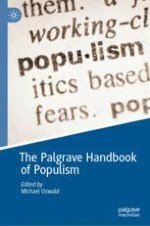2022 | OriginalPaper | Buchkapitel
26. Experience Narratives and Populist Rhetoric in U.S. House Primaries
verfasst von : Mike Cowburn
Erschienen in: The Palgrave Handbook of Populism
Aktivieren Sie unsere intelligente Suche, um passende Fachinhalte oder Patente zu finden.
Wählen Sie Textabschnitte aus um mit Künstlicher Intelligenz passenden Patente zu finden. powered by
Markieren Sie Textabschnitte, um KI-gestützt weitere passende Inhalte zu finden. powered by
